Has Anyone Actually Been Shamed For Wearing Makeup
"Putting on your face" is something that very many of us do on a daily basis. On average, women will spend "29 minutes putting on make-up to achieve a 'natural look,'" and a third of united states "never become out without make-up". And, over a lifetime women on average spend 136 days (3276 hours) "getting ready for a night out."
Once upon a time, respectable women didn't wear make-upward. Only "painted ladies," sex workers, wore brand-up; fabricated-up eyes, lips, and cheeks were how they advertised their trade. Gradually, make-upwardly became OK, so much and then that in the second world war lipstick was believed to be vital to morale; it was not rationed and was imported beyond blockades with other "necessary" supplies (Dyhouse, 2011, p.82).
Wearing make-upward is at present routine for many, required for work, special occasions, or to "face up the twenty-four hours." Make-up is part of who we are such that we tin enhance money by non wearing it! The 2015 'bare-faced' selfie campaign raised £eight,000,000 in six days for cancer research. The non-made-upwards face is rare, and evidently make-up even makes u.s. look more than competent and professional. In a study on the perception of females' (aged 25-50) faces with and without make-upward, "ratings of competence increased significantly with makeup", and likeability and trustworthiness also increased, although less significantly (Etcoff, Stock, Haley, Vickery & House, 2011, p.viii).
Simply this is not ever the case, and too much makeup tin have the opposite effect. A 2018 study found that "regardless of the participant's sex or ethnicity, brand-upwards used for a social night out had a negative effect on perceptions of women's leadership power." (James, Jenkins & Watkins, 2018, p.540). And in some professions wearing nigh whatever make-up marks you equally frivolous, unintelligent and not to exist taken seriously. Nonetheless while some professions require less brand-upward than others almost of us are doing more. For instance, some surveys suggest that the average women's make-upwardly routine in 2016 took 27 steps, compared to just eight in 2006. As almost of us clothing brand-up, not wearing it becomes abnormal—more of a political argument than a mode selection. What is the correct amount and how can we get it correct?
Some bullying statistics advise that, no thing what nosotros do, we can't do it right!
While 58% of people anile 13+ think "brand-up makes them experience confident" (Ditch the Label, 2017) 27% of people aged thirteen+ "have felt judged for wearing make-up". (Ditch the Characterization, 2017)
Similarly, 75% of people anile 13+ agree that "some women would look meliorate if they wore less make-upwards" (Ditch the Label, 2017). Simply 45% of 12-20 year olds agree that "unattractive people need to make more of an effort with their advent." (Ditch the Label, 2019)
This looks like an impossible circumvolve to foursquare, and that'south before you take into account that 63% of U.S. men agree that "women mainly article of clothing make-upwardly to trick people into thinking they're more attractive." (YouGov, 2017)
The #everydaylookism stories back this upwardly. We can be shamed for wearing make-up:
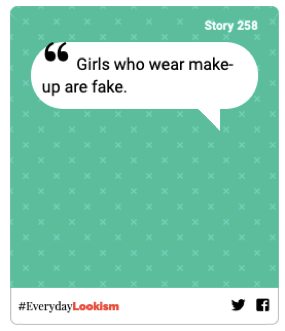
Story 258
Source: #everydaylookism campaign
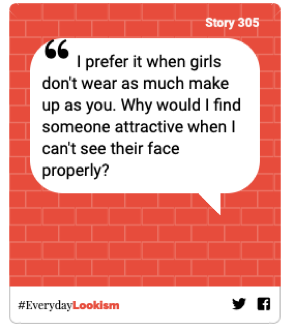
Story 305
Source: #everydaylookism campaign
And shamed for not wearing information technology:
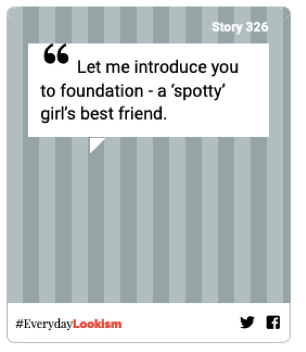
Story 326
Source: #everydaylookism campaign
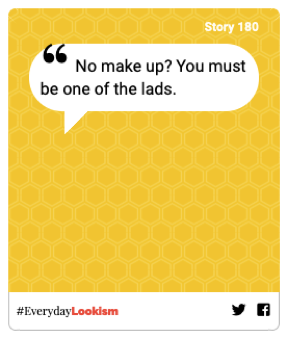
Story 180
Source: #everydaylookism entrada
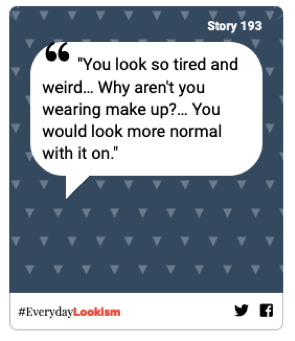
Story 193
Source: #everydaylookism campaign
We tin exist shamed past those who love united states of america:
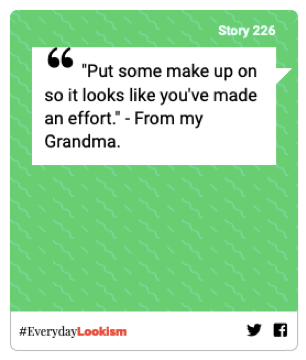
Story 226
Source: #everydaylookism campaign
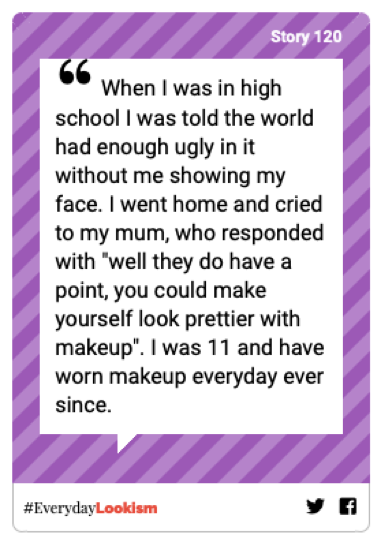
Story 120
Source: #everydaylookism campaign
Information technology doesn't even have to exist us wearing the make-upward to be shamed:
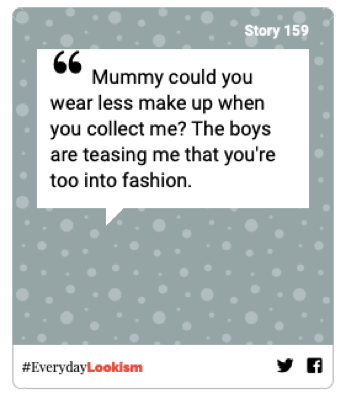
Story 159
Source: #everydaylookism campaign
These #everydaylookism stories evidence that we can't get it right. Too much and we're simulated, likewise niggling and we haven't fabricated an attempt or shown respect. This is going to get more hard as make-up options change and more culling means of making-up the face up become available. Semi-permanent make-up is becoming increasingly popular and looks like it is here to stay; permed and dyed eyelashes, loftier definition brows and tattooed lips are increasingly evident.
When practise you lot decide to practise your eyebrows? Those who don't wonder at those who do. "Don't they know they look abnormal?" a journalist recently asked me, commenting on the new trend. Merely no, they don't, as they are non abnormal in their peer group. No more abnormal than the flapper who cut her hair and put on lipstick in the 1920s. Normal is a moveable feast.
There is no right amount of make-upwardly. There may exist norms for unlike professions—more for the air hostess than for the professor—for different events; more for a wedding than for walking the canis familiaris.
But fifty-fifty these norms are beingness unsettled as nosotros make-upwardly not for the real earth but for the virtual world. The boilerplate xvi- to 25-twelvemonth-old women spends v and a half hours a week taking selfies, and "33% of women redo their makeup before taking photos". If nosotros have to exist photographic camera -eady at all times to post our perfect lives, then increasingly we take to be perfectly made-up, with make-up that is exaggerated and odd offline, fifty-fifty if it looks dandy online. If nosotros believe the projections, the amount of time and money we spend on making-up is only going to increase. The global make-upwards market place (for the face up) was worth $31.3 billion in 2018, and it is projected rise to 36.five billion by 2024.
The bottom line is, it'due south near incommunicable to navigate, which is another reason nosotros should effort to reduce the pressure, to tone downward the critique. #everydaylookism seeks to end torso shaming. If it becomes unacceptable to make negative comments on people's appearance—including their brand-up—then the pressure will decrease. We might still worry that nosotros are not getting it right, but nosotros won't worry that we'll be called out and shamed. Let'southward modify the civilisation, let's telephone call out torso-shaming as people-shaming and put a stop to it. Share your make-up story at: everydaylookism.bham.air conditioning.uk.
Heather Widdows, author of Perfect Me and professor in philosophy department at the University of Birmingham
Jessica Sutherland, enquiry banana and global ethics Ph.D. student at the University of Birmingham
References
Dellinger, K. & Williams, C. 50., 1997. Makeup at Work: Negotiating Advent Rules in the Workplace. Gender & Society, xi(two), pp. 151-177.
Dyhouse, C., 2011. Glamour: Women, History and Feminism. London and Mew York: Zed Books.
Etcoff, N. L. et al., 2011. Cosmetics every bit a Feature of the Extended Human Phenotype: Modulation of the Perception of Biologically Important Facial Signals. PLoS ONE, 6(10), pp. 1-9.
James, E. A., Jenkins, S. & Watkins, C. D., 2018. Negative Effects of Makeup Use on Perceptions of Leadership Power Across Two Ethnicities. Perception, 47(v), pp. 540-549.
Source: https://www.psychologytoday.com/us/blog/perfect-me/202001/girls-who-wear-makeup-are-fake
Posted by: thibaultdianow.blogspot.com

0 Response to "Has Anyone Actually Been Shamed For Wearing Makeup"
Post a Comment